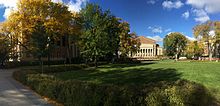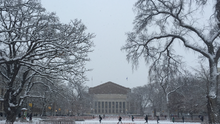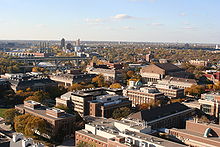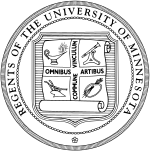|
Università del Minnesota
L'Università del Minnesota (in inglese University of Minnesota, spesso abbreviato "U of M", o semplicemente "U") è un'università degli Stati Uniti d'America con sedi a Minneapolis e Saint Paul. Fondata nel 1851, l'Università del Minnesota è oggi la sesta più grande università statunitense, con 51 800 studenti iscritti nell'anno accademico 2017-2018. È considerata una delle migliori università degli Stati Uniti[1][2] ed è tra le università con gli endowment in dollari più alti nel Nord America.[3] L'Università del Minnesota comprende al suo interno sedici College e Schools. Il campus dell'Università si estende lungo le rive est e ovest del fiume Mississippi. La riva est (East Bank) è quella in cui si trovano più edifici e strutture sportive, che coprono un'area complessiva di circa 2 730 acri (circa 11,04 km²). L'area è suddivisa in più sezioni: la Knoll area, la Mall area, la Health area, la Athletic area, e la Gateway area. L'Università del Minnesota è classificata come "R1: Doctoral Universities – Very high research activity."[4] L'Università del Minnesota è membro della Association of American Universities ed è classificata nella top 20 per attività di ricerca, con 1,84 Miliardi spesi in ricerca e sviluppo nell'anno fiscale 2020.[5] Nel 2001, l'Università del Minnesota è stata inclusa nella lista delle Public Ivy, che include le università pubbliche che offrono una qualità di istruzione accademica paragonabile alle università della Ivy League.[6] L'Università del Minnesota conta 26 Premi Nobel[7] e 3 Premi Pulitzer[8] vinti dai suoi professori, ricercatori, e laureati. La East Bank ospita anche uno dei musei dell'Università: il Frederick R. Weisman Art Museum, completato nel 1993 e progettato dall'architetto Frank Gehry. L'Università del Minnesota è membro della Big Ten Conference. Le squadre sportive (football americano, hockey su ghiaccio, basket) che rappresentano la University of Minnesota si chiamano Golden Gophers ed i colori delle maglie sono il bordeaux e l'oro. Suddivisione accademicaOrganizzazione e amministrazioneL'organizzazione accademica dell'Università è suddivisa in 19 facoltà o scuole (colleges in inglese), insieme ad altri dipartimenti indipendenti :[9]
Centri e istituti interdisciplinariL'università ha sei centri di studio interdisciplinari che permettono alle facoltà di "oltrepassare" i propri campi di studio e collaborare con dipartimenti che appartengono a diversi college:[10]
Campus UniversitariDati demografici e didatticiConsiderato come il più grande tra i 5 poli che compongono il sistema universitario dell'università del Minnesota con i suoi oltre 50 000 studenti, il campus di Minneapolis/St. Paul è a tutt'oggi quarto più esteso corpo studentesco di tutti gli Stati Uniti. L'università conta più di 300 tra istituti di ricerca, che variano dalle scienze matematiche, alle scienze sociali, umanistiche e alle tecnologie innovative. L'Università del Minnesota offre ben 143 diversi corsi di laurea,[11] e offre più di 200 corsi di laurea a livello magistrale (Master) e di dottorato di ricerca.[12] East Bank     West BankIl West Bank copre un'area di 53 acri (21 ha). Il West Bank Arts Quarter include:
Note
Altri progetti
Collegamenti esterni
|
||||||||||||||||||||||||||||||||||||||||||||


